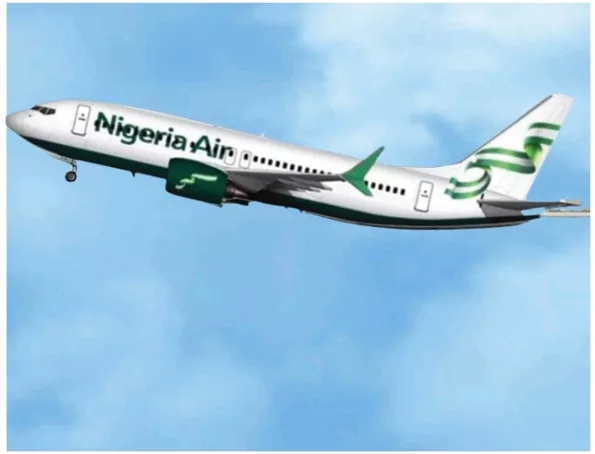The Nigeria Air project is currently embroiled in controversy, casting doubts on its viability and prospects of materialising.
Despite substantial financial investments made annually by the federal government through the Federal Ministry of Aviation, the project has faced numerous obstacles that appear insurmountable.
One major hurdle the national carrier failed to overcome was the court case initiated by the Airline Operators of Nigeria (AON), questioning the legitimacy and lack of due process in establishing the carrier. Furthermore, Nigeria Air lacked an Air Operating Certificate (AOC) and failed to meet the requirements of possessing three aircraft to initiate operations.
During an investigative hearing conducted by the House of Representatives, numerous revelations emerged, shedding light on the alleged insincerity surrounding the establishment of the national carrier.
Managing director of Nigeria Air, Captain Dapo Olumide, disclosed that the aircraft unveiled during the phony launch was a chartered plane from Ethiopia, specifically hired for a few days to showcase the logo to the Nigerian public and shareholders.
Captain Olumide confirmed this information when he appeared before the senate committee on aviation, clarifying the controversies surrounding the prospective airline, which was launched just before the previous administration’s tenure ended.
He explained that the unveiled aircraft was not registered in Nigeria and had only obtained temporary clearance from Ethiopia before its arrival and subsequent return.
Olumide emphasised that Nigeria Air, as it stands, lacks the necessary requirements to operate as an airline within the country.
He further revealed that Nigeria must have three registered Nigerian aircraft before obtaining the required licenses from the Nigeria Civil Aviation Authority (NCAA).
Olumide’s mandate was to secure an air operating certificate for the airline, not to operate it, but to obtain the license to fly.
According to him, “The aircraft that came in and left was a legitimate charter flight. Anyone of us here if we have a destination wedding in Senegal, we can charter an aircraft.
“You don’t need to have a license to do that, you just charter an aircraft, an aircraft you paid for, it will be brought here, take your passengers and off you go.
“And that is what we did. But in this case, it was to unveil the logo of Nigeria Air. Ever since 2018, all you have ever seen about Nigeria Air were pictures, drawings not the real aircraft, and we thought it was time to show what the real aircraft will look like also to let shareholders see. We have institutional investors, they are not in aviation but they are putting their money for 10 to 15 years, so they need to see what the actual aircraft will look like.
“So we brought it in here to show them what the aircraft will look like, then the social media dimension came into it.
“For us to get that license which is my mandate, we must among other things have three aircraft before the NCAA will give us a license and those three aircraft must be Nigerian registered aircraft.
“So when this aircraft came on a chartered flight, everybody said we have launched Nigeria Air, there are learned people in the aviation industry who could have countered that when social media came out, but they chose not to.”
Chairman of the house committee on aviation, Nnolim Nnaji, declared the Nigeria Air launch a fraud after major stakeholders, including Ethiopian Airlines, denied any knowledge of the launch. The ministry of aviation’s claim that Nigeria Air was merely unveiled, not launched, was dismissed by the committee as an attempt to divert attention.
In light of the revelations from the House of Representatives, industry stakeholders have called for an investigation into the actions of the former minister of aviation, Sen. Hadi Sirika.
Chairman of the senate committee, Sen. Biodun Olujimi, expressed disappointment at the lack of involvement of the committee and other stakeholders in the Nigeria Air project.
He criticised the former minister of aviation for disregarding the committee’s input during the entire process.
“To state the obvious, he failed to carry members of the committee along in virtually all ramifications despite the degree of respect members accorded him any time he was invited for meetings,”Olujimi said.
A stakeholder who craved anonymity said, “The minister of aviation deceived Nigerians with the Nigeria Air that was brought in hours before the end of the tenure of the last administration. It’s been revealed that the airline which belongs to Ethiopia was chartered for the days it was in Nigeria.
“At the moment Nigeria does not have an operating license to commence Nigeria Air operations. One of the requirement to operate in Nigeria is that the plane must be registered in Nigeria and it must commence with a minimum of three planes.
“President Tinubu needs to take a serious look at issues like the Nigeria Air and make whoever is culpable pay as this will go a long way in reposing the confidence of Nigerians in his administration. This is totally a criminal offense which must never be allowed swept under the carpet.”
Also speaking, the chief executive officer, Centurion Security, Capt. John Ojikutu (rtd), urged the government to discard the idea of national carrier as it has become a drain pipe on the economy.
According to him, what Nigeria needs now are two flag carriers which should be for regional and continental and the other for intercontinental which should come from the existing domestic carriers.
He said, “No government of any developing country has the financial resources to solely finance an airline, not even the USA that happened to be the largest economy in the world. They don’t have a national carrier but flag carriers. Please, Nigeria should discard what the ex-minister Sirika did with the industry at quarter to go.
“The new administration should discard the idea of a national carrier but flag carriers at least two: one regional and continental and the other intercontinental from the existing domestic carriers. National carrier as being envisaged will end up as government carrier and die as the Nigeria Airways.
“For each of the domestic carriers to become flag carrier, its ownership must not be more than 40 per cent, 24 per cent to credible Nigerian investors from the six geographical zones, 16 per cent for the federal government and the 36 states and the balance of 20 per cent to the Nigerian public through the stock market.
“We had same partnership in the 90s with KLM and South Africa Airways and it didn’t work. I can’t see a difference today. Please discard the idea of national carrier which for long has become a drain pipeline. Government has no business in commercial aviation but only in regulations, safety and security services.”
Reactions from Nigerians following the unveiling of Nigeria Air have been mixed. Some, like David Hundeyin, have raised concerns about the authenticity of the aircraft, highlighting that it belongs to Ethiopian Airlines and is still actively in service.
Others have called for accountability and transparency, suggesting that the project be abandoned altogether.
A member of the Airline Operators of Nigeria (AON) and the chief executive officer (CEO) of Top Brass Aviation Limited, Captain Roland Iyayi, criticised the lack of transparency in the establishment of the national carrier. He argued that Nigeria should focus on developing two-flag carriers—one for regional and continental
He said, “Essentially what we have gone to court to say is that the entire process, the bidding, the selection and whatever it is we have today was not transparent. Again, we went on to say that most of the things that have been alluded to, we actually have proof to indicate that these are things that run counter to the provisions of the Infrastructure Concession Regulatory Commission (ICRC)law for the country.
“We have asked the court to simply interpret our position and see if indeed we are correct. If we are correct, it means the entire process is wrong. Now, the minister approached the public and said that five per cent of this entity will be held by the Nigerian Sovereign Wealth Fund. They came out within minutes and said they are not part of it. Then again, the minister said 46 per cent will be held by Nigerian institutional investors. So far, we have MRS, SAHCO and the supposed Nigerian institutional investors.
“Meanwhile, SAHCO is a company under the group Sifax. Sifax actually put in a bid for the concession of Murtala Muhammed Airport in Lagos and they never wanted to be part of Nigeria Air. But for whatever reason, it was put as a member of that institutional investor team and they know very little about it. And that is the much we have found out so far.
“So, invariably, we are asking the question if Sifax is not part of this 46 per cent, and we have not heard from MRS, who exactly is holding those shares? And if they are being held, is it by proxy and for whom? So these are questions we have raised in the document we presented to the court for interpretation. And when we see what was filed by the ministry, their defence, indeed what they said is that this process is a PPP process. But the Ethiopian Airlines’ defence said no, that they know nothing about a PPP and the 49 per cent they have acquired in this project is absolute.
“So, our question is, if 49 per cent is absolute, how much is 49 per cent worth? And then the 46 per cent, is it allocated or paid for by way of subscription and by who?
“All of these are questions we have asked and they have never been answered by the then minister, not by the ministry and not by Ethiopian Airlines. All Ethiopian Airlines has said is that this is business, they have put in a bid, they have won, and it is clear that the 46 per cent is absolute. Then we now take cognisance of the fact that between 2016 and 2022, the federal government has budgeted N85.42 billion as appropriation for Nigeria Air. Where has that money gone to?
“Now if that money represents five per cent, how much has Ethiopian Airlines paid for the 49 per cent it is holding, how much have they put in the coffers of the federal government? How much do we have in the Central Bank today? Now, Qatar Airways took out 49 per cent of Rwanda Air and they paid $1.3 billion.”





